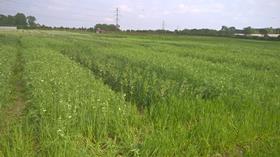
An innovative research project in Scotland is aiming to demonstrate the benefits of using crop species mixtures as a sustainable crop production system.
The Sustainability in Education and Agriculture using Mixtures (SEAMS) initiative is providing a platform for knowledge exchange on food production, agricultural ecology and environmental sustainability in Scotland.
SEAMS, which has been funded by the Esmée Fairbairn Foundation, and is being coordinated by the James Hutton Institute, is developing a network of farm-based sites across the main arable food production areas of Scotland.
These sites will trial crop mixtures, providing information on how to tailor their use to different locations in the country.
Previous research projects have demonstrated that crop mixtures can improve yield stability, reduce pest and disease damage, and enhance stress resilience in agricultural systems.
Professor Rob Brooker, an ecologist based in the Institute’s Ecological Sciences group and coordinator of the SEAMS project, said: “This is a vital time for developing sustainable land management approaches that work for Scotland.
“I am delighted that, thanks to the support of the Esmée Fairbairn Foundation, SEAMS can bring together this partnership of organisations to promote the understanding and use of crop mixtures in Scottish farming”.
The project involves and is supported by partner organisations including Buglife Scotland, Game and Wildlife Conservation Trust, LEAF, NFU Scotland, The Royal Highland Education Trust, Scottish Natural Heritage, Soil Association Scotland, and Scottish Agronomy.
SEAMS core sites will provide a platform for knowledge exchange and learning and will host visits from a range of different groups, all of which have important roles to play with regards to promoting the use of crop mixtures.
The sites will be used as a hub for discussions with local farmers from the area, with the aim of establishing a wider set of network sites.
Through working with food buyers and producers, the SEAMS team hope to increase the demand for local products derived from the mixtures. The project also plans to connect with policy makers to promote the use of crop mixtures within future agricultural policy.
To complement the field sites, SEAMS will be providing a range of guidance and education material on crop mixtures. In particular, local schools will be encouraged to engage in citizen science activities at the SEAMS sites, using it as an opportunity to find out more about sustainable food production and the ecology of farmed landscapes.
Professor Brooker added: “It is very exciting that we can use our trials as a platform for school visits and educational activities looking at farming and the role of biodiversity in our farmed landscapes.”



